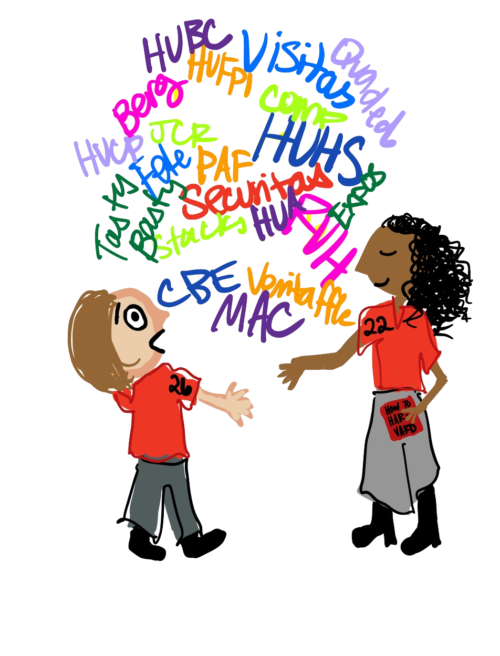Harvard is still alphabet soup to them. Comp, Tasty Basty, Expos, Securitas, Quaded, Blockmate, Berg, Veritaffle — not to mention CBE, RVH, PAF, UC, HUA, HUCP, HUFPI, JCR, and a host of other elusive acronyms. From April 24th to 25th, Visitas commenced in-person for the first time in two years, inviting the Class of 2026 to Harvard’s campus where they will begin to learn its language in the fall.
On these same days, seniors posed on the cascade of the Widener steps, theses in hand. “Analysis of Batch Effects in Cancer Mutational Signatures” by Andrea River ’22. “‘Un Acto Revolucionario’: A History of Health, Abjection, and Womanhood in the Maquiladoras of Ciudad Juarez, 1980-2001” by Kendra Heredia ’22. Not only are these seniors experts in their field of study, but they have become native speakers of the Harvard dialect over their four years.
Though pre-freshmen lack familiarity with the words and realities of Harvard life, after just three days of Visitas, they shared departing seniors’ sentiments on the dichotomy between Harvard’s intellectual intensity and inclusive community.
When asked to describe Harvard, seniors and pre-freshmen equally endorsed the breadth and depth of its academics. One student at Visitas, Yanna Bravewolf ’26, commended the “Visitas Thinks Big” event, a panel in which several professors such as economist Raj Chetty presented their classes and research. Bravewolf also had the opportunity to attend a differential equations class. She says, much to her surprise, that it was “probably my favorite thing from the whole weekend.” Visitas exposed new admits to Harvard’s intellectualism through its breadth and depth.
As a parting reflection on his four years at Harvard, Eli Burnes ’22 similarly emphasized the intensity for academics at Harvard. He marked the quality of the teachers and students and a creative writing elective as his college highlights. He explained that each individual in his class expressed a love for writing that made Harvard’s academic experience particularly fulfilling.
But while academic intensity was apparent to both pre-freshmen and seniors, students unanimously commented on Harvard’s community: its inclusivity, its passion, its cordiality.
Elysia Li ’22 said that the biggest benefit of going to Harvard is “meeting a lot of people.” She described her classmates as “interested”: students are not only interesting, but more importantly, they are engaged and committed to their pursuits. Sarah Toth ’26 offered this impression based on her Visitas weekend as well. She commented that “students want you to connect to other students, even when it’s not them that share your interest.” She explained that upperclassmen would introduce her to peers who might expand her academic and extracurricular goals and with whom she could collaborate in the future.
Bravewolf concurred: although she expected some snobbiness or pretention, she found the opposite to be true: the students she met were very welcoming. “I think that everybody is so talented and so incredible at Harvard, but at the same time, so down to earth, and so approachable and helpful,” she said. Harvard is special for its “two aspects of great academics and just great people.”
Based on these impressions, Harvard’s return to in-person Visitas cemented pre-freshmen with the idea of community and involvement that underlay seniors’ final thoughts. Bravewolf even said that she thinks an online Visitas would have failed to impart these impressions for her.
When asked to describe his four years at Harvard in one word, Burnes said, “fast.” Indeed, the distance between the seniors and the incoming first-years in the Yard this April didn’t seem so vast.
Mary Cipperman ’25 (mcipperman@college.harvard.edu) went to VisiTASTY for five minutes and decided she will be avoiding freshmen on weekend nights in the future.

